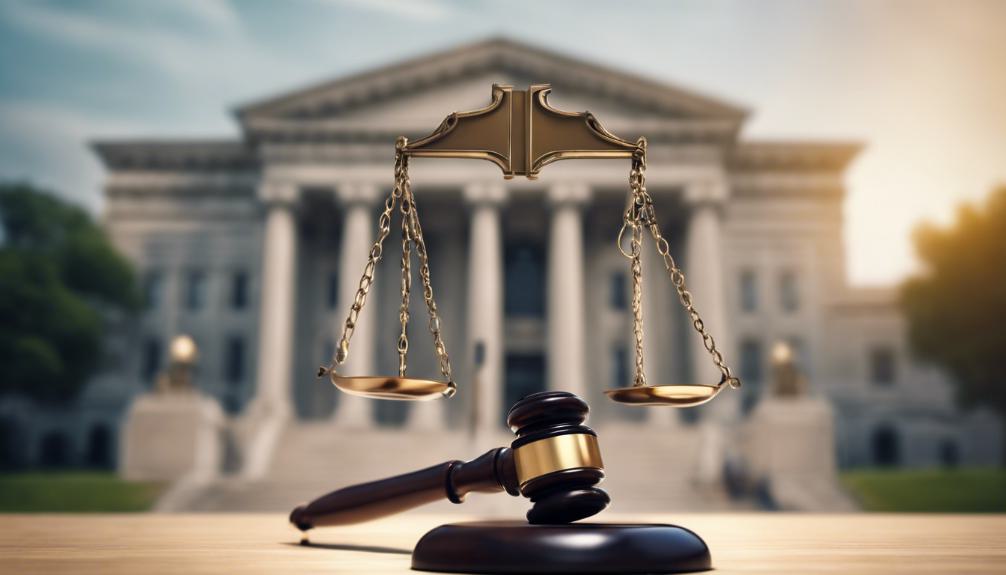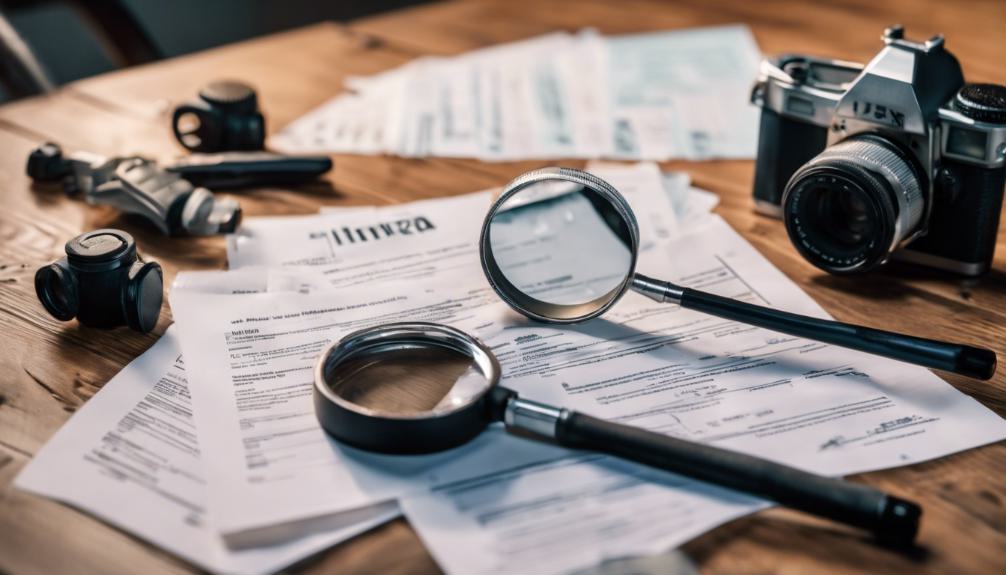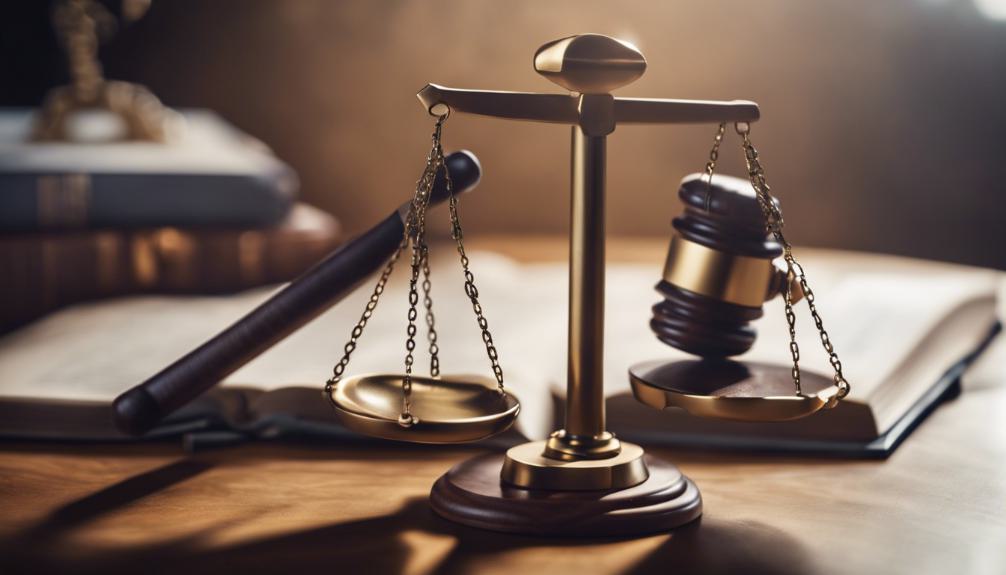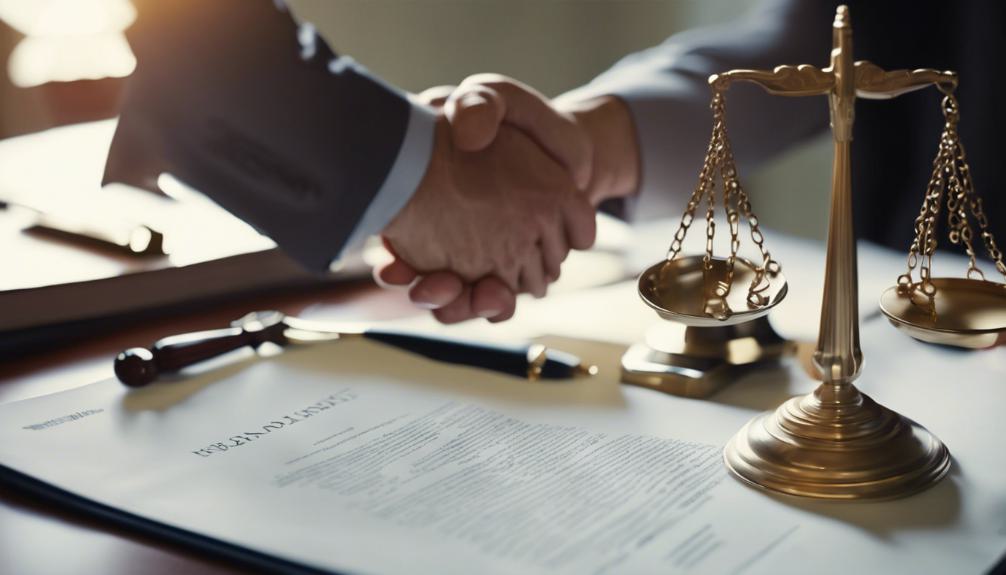How To Hire A Personal Injury Attorney
Imagine you've just been in a car accident; your vehicle is damaged, and you're nursing significant injuries. You're thinking about seeking justice and compensation, but you're unsure where to begin. It's imperative that you don't rush into hiring the first personal injury attorney you come across. Instead, you'll need to conduct thorough research, scrutinize their track record, and make sure they have the expertise to handle your specific case. The right attorney can make all the difference in managing the complexities of your case and securing the compensation you deserve. But, how do you sift through the sea of attorneys to find the one that's right for you? Let's explore some key considerations that can help you make an informed decision.

Key Takeaways
- Screen multiple personal injury attorneys to compare their experience, success rates, and fees.
- Gather and organize all relevant documents, photos, and witness information early in the process.
- Understand the legal process, including the roles of settlement and trial, and your responsibilities.
- Consider attorneys who offer free consultations to assess suitability and understand potential case outcomes.
Initial Hiring Steps

Before you start on hiring a personal injury attorney, it's important to first address your immediate health needs and guarantee your injuries are thoroughly documented. Seeking immediate medical attention not only guarantees your well-being but also establishes an essential record for your case. Follow your doctor's orders closely during your recovery; this adherence further strengthens your claim. If you suspect medical malpractice, consider getting a second opinion to support your case. These steps are foundational before diving into the legalities. They create a solid base for your claim, ensuring that when you're ready to hire an attorney, you've taken the necessary precautions to protect both your health and your legal rights. Remember, your recovery and documentation are priorities at this stage.
Gathering Claim Evidence

Once you've addressed your immediate medical needs, it's important to start collecting evidence for your personal injury claim. Begin by gathering any documents, reports, and photos related to your injury. It's essential to start this process early to guarantee nothing is overlooked or forgotten. Take pictures and videos at the scene of the incident to document the conditions and any immediate damages or injuries. Additionally, obtain contact information for any witnesses who can support your account of events. Organize all documents and records meticulously; this will streamline your case and assist your attorney in building a strong argument. Remember, the evidence you collect plays a pivotal role in substantiating your claim and securing the compensation you deserve.
Selecting Your Attorney

After gathering the necessary evidence for your claim, it's time to find the right personal injury attorney to represent you. Start by screening multiple attorneys, focusing on their expertise, success rate, and the largest settlements they've achieved. Don't hesitate to ask about their trial experience and any professional recognition they've received. Understanding the potential expenses and case timeline upfront is vital. Most personal injury attorneys offer free consultations, which you should take advantage of. This is your chance to ask questions and get a feel for whether they're the right fit for you. Remember, the attorney you choose will play a significant role in the outcome of your case, so choose wisely.
Legal Process Insights

Understanding the legal process in a personal injury case is essential to navigate it effectively. Initially, your attorney will gather all necessary evidence, including medical records, incident reports, and witness statements. This phase is critical, as the strength of your case largely depends on the quality and quantity of evidence you can provide.
Your role includes providing detailed information about the incident and your injuries, attending meetings, and possibly participating in mediations. Remember, your attorney handles the legal paperwork and represents you in court, but your cooperation is vital. Be prepared to be actively involved, especially in gathering and organizing documents. Knowing these steps demystifies the process, making it less intimidating and more manageable for you.
Settlement Versus Trial

Deciding between a settlement and going to trial is an important step in your personal injury case. Most cases settle out of court, which can save you time and reduce stress. Settlements often provide a quicker resolution, allowing you to cover medical bills and other expenses sooner. However, if the offer doesn't meet your needs, going to trial might secure a more favorable outcome. It's important to weigh the certainty of a settlement against the potential of a higher award at trial. Remember, trials are unpredictable and can extend the time before you receive compensation. Your attorney will guide you, balancing the likelihood of winning at trial against the guaranteed sum of a settlement, to decide the best course for your situation.
After Hiring Your Attorney

Once you've decided on the path forward with your personal injury case, hiring the right attorney is your next step to make sure you're well-represented. After you've hired your attorney, it's essential to communicate openly and provide all the necessary documents and evidence you've collected. Your attorney will likely ask for medical records, photos of the injury, and any witness statements you have. It's your job to assist them by gathering this information promptly. You'll also need to keep them updated on your recovery progress and any changes in your medical condition. Remember, your attorney is there to guide you through the legal process, but they'll need your cooperation to build a strong case. Stay engaged, ask questions, and follow their advice to maximize your chances of a favorable outcome.
Frequently Asked Questions
How Do I Know if My Case Qualifies as a Personal Injury Claim?**
To know if your case qualifies as a personal injury claim, check if you've suffered harm from someone else's negligence. Document injuries, gather evidence, and consider consulting an attorney for a professional opinion.
This Question Addresses the Initial Confusion Many Potential Clients Have Regarding the Nature of Personal Injury Law and Whether Their Situation Fits Within Its Parameters.
Ironically, you're unsure if your situation qualifies as a personal injury case, yet here you are, knee-deep in information. Start by evaluating your circumstances against the basics of personal injury law to find clarity.
Can I Switch Personal Injury Attorneys if I'm Unsatisfied With My Current Representation?**
Yes, you can switch personal injury attorneys if you're unsatisfied with your current one. It's important to find someone who meets your needs and expectations to guarantee the best possible outcome for your case.
Many Individuals May Not Be Aware of Their Rights to Change Attorneys if They Feel Their Case Is Not Being Handled Appropriately or to Their Satisfaction.
You've every right to switch attorneys if you're unhappy with your case's handling. It's important to find someone who meets your needs and guarantees you're comfortable and confident in their ability to represent you.
What Are the Tax Implications of a Personal Injury Settlement?**
You're standing at a crossroads: one path leads to tax-free personal injury settlements, generally the norm, while the other may involve taxes on punitive damages. It's important to distinguish between the two for your financial health.
Conclusion
As you step into the legal battlefield, armed with evidence and guided by a skilled personal injury attorney, envision the path to justice like maneuvering a maze. Each turn represents a critical decision, from gathering evidence to choosing settlement or trial. With your attorney as your navigator, you'll move confidently through twists and turns, heading towards the light of compensation and closure. This journey, though challenging, is a proof of your resilience and determination to seek the justice you deserve.

This post has been generated by AI and was not reviewed by editors. This is Not legal advice. Please consult with an attorney.




